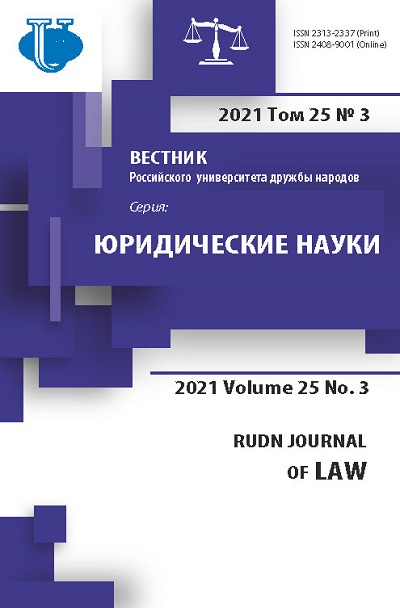The concept of “strong state” in the political and legal dimension
- Authors: Malinovsky A.A.1,2
-
Affiliations:
- Moscow State Institute of International Relations of the Ministry of Foreign Affairs of the Russian Federation (MGIMO University)
- Russian Academy of Sciences
- Issue: Vol 25, No 3 (2021)
- Pages: 506-526
- Section: STATE AND LAW IN CONTEMPORARY WORLD
- URL: https://journals.rudn.ru/law/article/view/27215
- DOI: https://doi.org/10.22363/2313-2337-2021-25-3-506-526
Cite item
Full Text
Abstract
The concept of “strong state” in the general theory of state and law has not been studied in sufficient detail. In political science, the science of administrative law and in international legal doctrines, this concept is considered mainly from geopolitical, military-strategic and political-administrative positions. In the presented article, a theoretical and legal analysis of the concept of a strong state is carried out. Methodologically, the author adheres to the approaches of political realism and realistic theory of law, which are aimed not at building a model of an ideal strong state, but at studying really functioning strong states with all their problems and contradictions. It is proposed to understand a strong state as a state that effectively uses any legal means to carry out the functions assigned to it in its own political interests. The article in the format of a scientific discussion analyzes the signs and criteria of a strong state, characteristics of the law of the strong. The research subjects also include the problem of a strong state legitimacy, the category of the great power and the process of legal expansion.
About the authors
Aleksey A. Malinovsky
Moscow State Institute of International Relations of the Ministry of Foreign Affairs of the Russian Federation (MGIMO University); Russian Academy of Sciences
Author for correspondence.
Email: Dr.malinovsky@yandex.ru
ORCID iD: 0000-0002-2376-0956
Doctor of Legal Sciences, Head of the Department of Theory of Law and Comparative Law, International and Law Faculty, Moscow State Institute of International Relations (University) of the Ministry of Foreign Affairs of Russia; Expert of the Russian Academy of Sciences
76 Prospect Vernadskogo, Moscow, 119454, Russian Federation; 14 Leninsky Prospect, Moscow, 119991, Russian FederationReferences
- Alekseev, S.S. (1998) Philosophy of Law. Moscow, Norma Publ. (in Russian).
- Baev, V.G. (2018) “Strong state” in the political and legal views of the German chancellor Otto von Bismarck. Law: history and modernity. (4), 74-82. (in Russian).
- Belov, L.P. (2019) Strong State: Towards Building a Theoretical Model. Management Consulting. (4), 114-122. (in Russian).
- Congyan, Cai (2013) New Great Powers and International Law in the 21st Century. European Journal of International Law. 24 (3), 755-795.
- Farkhutdinov, I.Z. (2016) International law and the US doctrine of preventive self-defense. Eurasian Law Journal. 2 (93), 23-31. (in Russian).
- Fedorov, S.M. (2018) French experience of a “strong state” (To the 60th anniversary of the adoption of the constitution of the Fifth Republic). Law: history and modernity. (4), 124-130. (in Russian).
- Fukuyama, F. (2006) A Strong State: Governance and World Order in the 21st Century. Moscow, ACT Publ., Khranitel’ Publ. (in Russian).
- Ham van, C. & Seim, B. (2017) Strong states, weak elections? How state capacity in authoritarian regimes conditions the democratizing power of elections. International Political Science Review. 39 (1), 49-66.
- Hobbes, T. (2001) Leviathan, or Matter, Form and Power of the Church and Civil State. Translated by A. Guterman. Moscow, Mysl’ Publ. (in Russian).
- Karnaushenko, L.V., Trikoz, E.N., Shvets, A.A. & Yablonsky, I.V. (2019) Legal systems of the states of the Commonwealth of Nations (Australia, Canada, India). Krasnodar, Krasnodar University of the Ministry of Internal Affairs of Russia. (in Russian)
- Kerimov, A.D. & Kuksin, I.N. A strong state as a determining factor in social progress. Moscow, Norma Publ. 2018. (in Russian)
- Kravchenko, L.I. (2015) Indicative assessment of the effectiveness of public administration. Successful development of social systems and public policy and governance. Materials of the All-Russian scientific and public conference. 358-365. (in Russian)
- Lukashuk, I.I. (2004) Modern law of international treaties. Vol. 1. Moscow, Volters Kluver Publ. (in Russian).
- Malinovsky, A. & Trikoz, E. (2020) International Treaty Rulemaking as a Political Process: History and Theory Issues. International Trends. 18. (2(61)), 6-30. doi: 10.17994/IT.2020.18.2.61.2
- Mathieu, B. (2021) Right versus Democracy? Trans. Lebedeva Ya.I.; Kovler A.I. (ed.). Moscow, Norma Publ. (in Russian).
- Noskov, E.G. (2011) Ontology of power: totality and symbolic nature of power relations. Diss…. Doctor of Philology. Cheboksary, Chuvash State University. (in Russian).
- Ponkin, V. (2018) Strong state. Law and state. 1-2 (78-79), 55-56. (in Russian).
- Romanova, E.V. (2016) Interpretations of the “European Concert” in British and American historiography of the 20th century. Bulletin of MGIMO University. 1 (46), 7-17. (in Russian).
- Sokolskaya, M.V. (2014) Legal expansion as a historical form of legal acculturation. Actual problems of Russian law. 7 (44), 13-38. (in Russian).
- Trikoz, E.N. & Krasheninnikova, N.A. (2020) Comparative Criminal Law (India): Student book. Moscow, Yurait Publ. (in Russian).
- Troshchinsky, P.V. (2016) Modern legislation of the PRC: problems and development prospects. Journal of foreign legislation and comparative jurisprudence. (3), 24-31. (in Russian).
- Zagainov, E.T. (2006) Preemptive Self-Defense in the Western Doctrine of International Law. Moscow Journal of International Law. (2), 29-45. (in Russian).
- Zhidkov, O.A. (1971) The history of bourgeois law (before the period of the crisis of capitalism). Moscow, Nauka Publ. (in Russian).
















